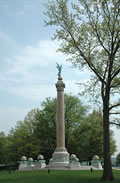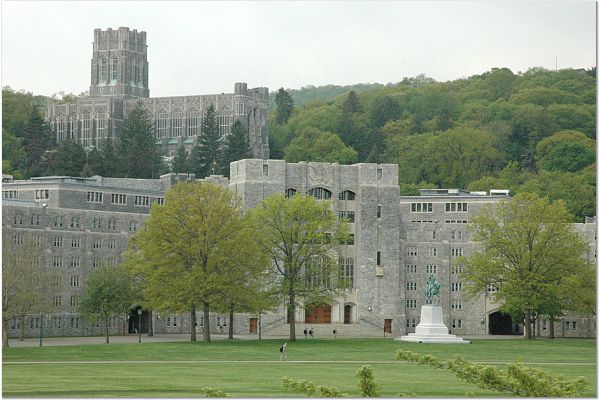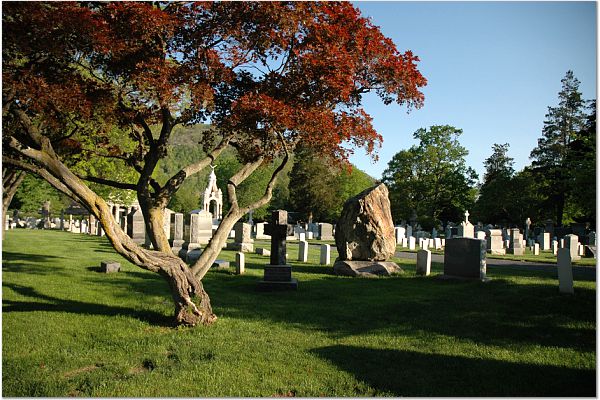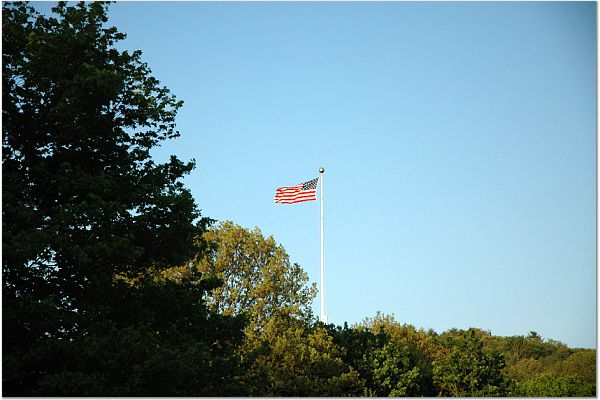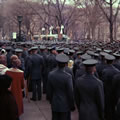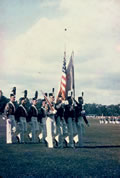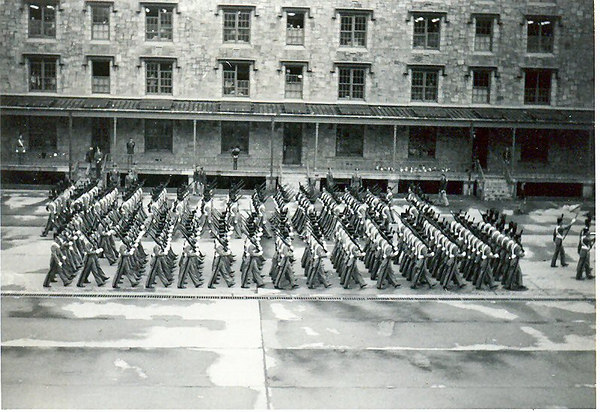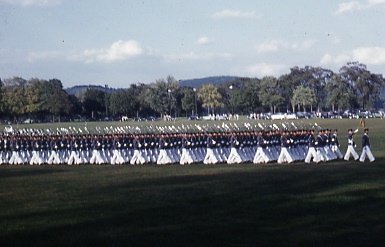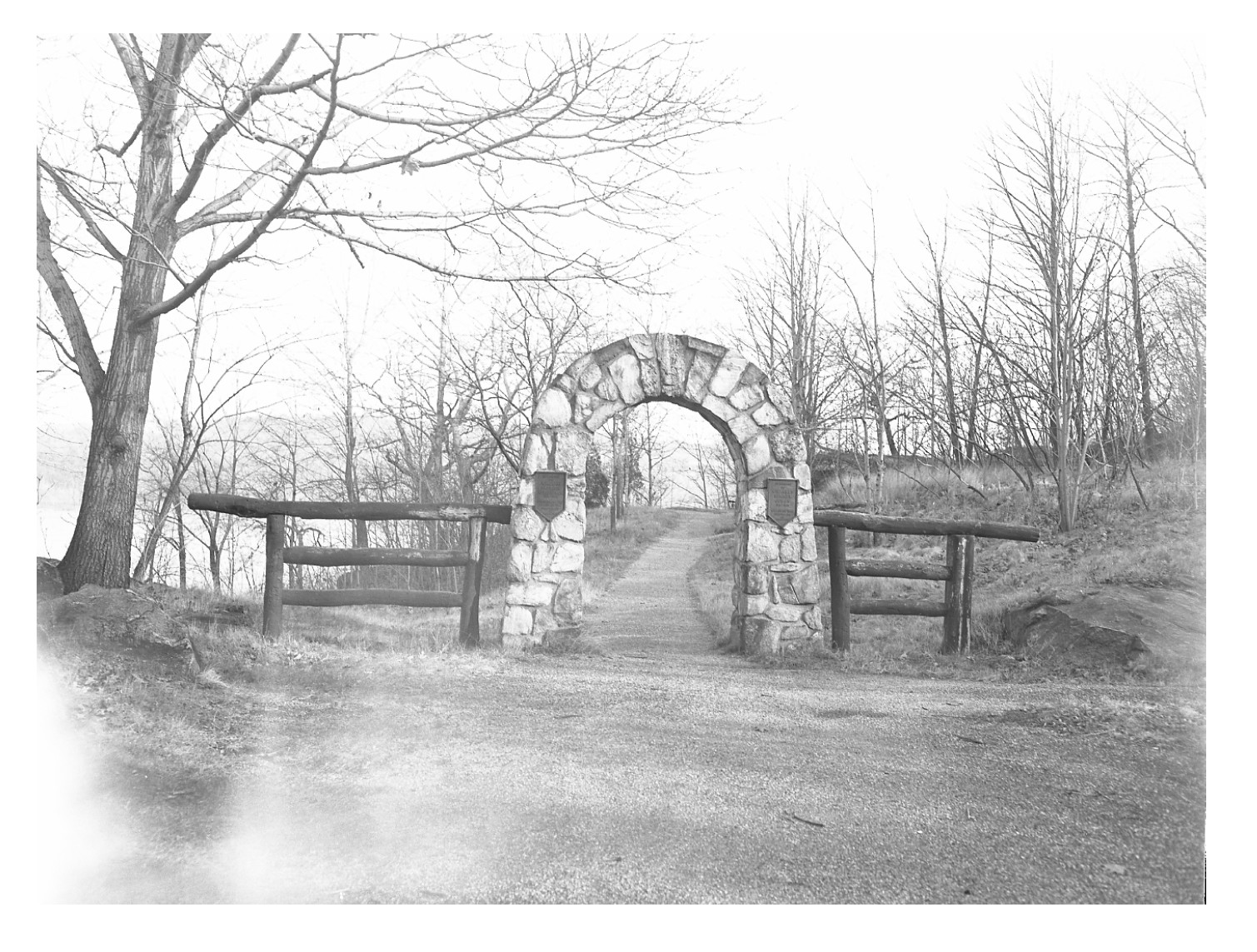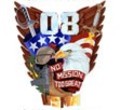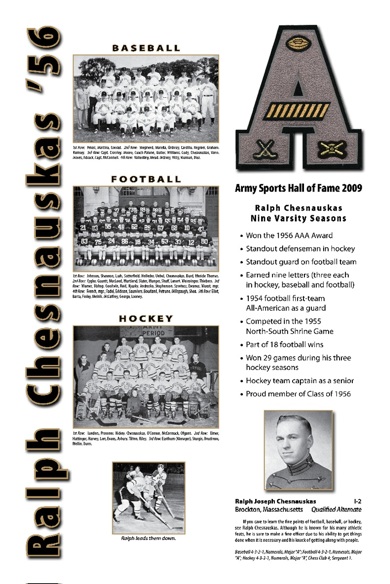1963 Team
Army 1963 7-3
1963/12/07 Army 15 - Navy 21 L
1964 USMA Howitzer: http://archive.org/details/1a964sf
Football pages begin here: http://archive.org/stream/1a964sf#page/n455/mode/2up<;/b?
Coach Paul Dietzel 1962-1965
LSU 46-24-3 National Champs 1958
Army 21-18-1
South Carolina 42-53-1
Total: 109-95-5
Army:
1962 Army 6-4
1963 Army 7-3
1964 Army 4-6
1965 Army 4-5-1
Army Totals: 21-18-1
http://en.wikipedia.org/wiki/Paul_Dietzel
----------------------
By Rabble
Apr 26, 2003
Football: 1963 football preview - A look back at the 1963 football preview.
1963. Its Coach Paul Dietzel's second year as Head Coach of West Point Football. In this pre-season report,
Jesse Abramson of the New York Herald Tribune gives a detailed description of the Black Knights and a new quarterback by the name of Stichweh--
The day after Army took that pasting from Navy for the fourth straight year, Paul Dietzel and his troops stopped for lunch on the mournful drive back to West Point. In a Jersey roadside restaurant the business of finding a new quarterback, some kind to answer to Roger Staubach, began.
"It wasn't a happy lunch," recalled Dietzel yesterday. "Every detail of that horrible debacle was, still is, firmly engraved on my mind. Rollie came to our table and said, 'Coach, I think I can do the job at quarterback; can I have a try at it?' And I said, 'You're dad-burned right you can have a try.'" The next day Carl Stichweh of Williston Park, L.I., who is Rollie, began warming up the arm which had been rusty since he quarterbacked Mineola High. On a handball court through the winter he played pitch-catch with Cammy Lewis, one of the three graduating quarterbacks and in the spring Rollie hammered down his claim to the job, proving he was a passer, completing 85 per cent (no one is that good in a game) and taking off as a runner on options.
As a plebe he had been converted to halfback for his speed; as a yearling last year he played defense with the Chinese Bandits while Army's offense sputtered (averaging only one touchdown in major action) for want of a Grade A passer. Stichweh, pronounced Stitch-way by all except Dietzel who rhymes it with that-a-way, is a blond six-footer of 185 pounds, the Phys Ed champion of the Corps. He may not be the complete answer to
Navy's Staubach, but the QB problem is the one Army has to lick with new men.
In a Capsule New quarterback and health of ends are keys to improved offense, while Dietzel dotes on middle of interior line. Formation used: Flip-flop-split-end T with wingback. 1963 Schedule: Sept. 21, Boston U.; 28, Cincinnati. Oct. 5, at Minnesota; 12, at Penn State; 19, Wake Forest; 26, Washington State; Nov. 2, Air Force at Chicago; 9, Utah; 16. at Pittsburgh; 30, Navy at Philadelphia.
--
The Black Knights have, as an alternate who directs the second unit, another good runner with a fine arm. He is sophomore Curt Cook, square first name Shannon, a 6-1; 187-pound Oklahoman. With these quarterback rookies, plus seasoned hands everywhere else on the first team (some in new positions), Dietzel contemplates greater progress in the second year of his mission on The Plain. The first civilian non-graduate in the football chair at West Point knows that winning football games from Penn State, Pitt, Minnesota, the Air Force et al, is desirable but means nothing if the Navy game is lost. Since Red Blaik's unbeaten 1958 season, Army hasn't had a losing season, but it hasn't beaten Navy. The schedule is being improved, too. Army will be tougher, smarter, faster, vows Dietzel.
His chief concern besides quarterback is at end, not because he lacks talent there but because four of his top six ends missed spring drills and the first-string pair was re-injured at Camp Buckner before the squad of 70 returned to the academy this week. Army had trouble mustering sound ends last year. "Our offense, basic and simple last year, will be enlarged by half again as much," said Dietzel. "We'll throw more (Army averaged
only 11 passes a game) and more successfully. Instead of a slot T, we have a flip-flop split-end T with wingback, the split-end and wingback always the same, left or right formation, which explains flip-flop."
Gone are the Regulars, Go Team and the exotic Chinese Bandits with their coolie-hatted rooters, as two-way
football, to Dietzel's regret, replaces three-team platoon operations now banished by 1963 rules.
Stichweh and Cook figure to get more backfield aid. Ken Waldrop at tailback is a walloping 198-pound ball
carrier now running with authority. Rounding out the heavy-weight foursome are fullback Ray Paske and wingback John Johnson, solid, steady performers, Johnson a crack receiver and all strong on defense, a first requirement under Dietzel.
The breakaway runner Army has needed may have arrived in Tom Smith, tailback behind Waldrop, a 188 pound yearling from Kinnelon, N. J., outstanding athlete in New Jersey In his last year at Butler High. "He's like the good Army backs of years gone by," said Dietzel, recalling Bobby Jack Stuart and Gil Sptehenson from his
earlier coaching stint under Blaik.
Dietzel's pride on a formidable line is the middle trio center Lee Grasfeder, guards Tom Cunningham and Dick
Nowak, the line-backing stalwarts of the Chinese Bandits, now geared for two-way action. Cunningham had been
a fullback. Nowak now deploys in the line of defense. They are tackling terrors.
At 202 to 214 pounds, they are not Goliaths, but, notes Dietzel, "they are as good as we've ever had and will match or outmatch any one we play." Ed Schillo, shifted from guard, and Bill Zadel, head a tackle corps that includes Chet Kempinski, Tom Kerns and sophomore John Carber (6-4, 225), outstanding plebe lineman last year.
Bill Chescavage, coming back from a springtime knee operation, is the split end, Bill Sherrell, ex-tackle, the tight end. Both have to prove they can stay sound of limb. Dietzel has made a number of switches and is happiest over the shift of John Seymour, Army's top rusher (539 yards) from tail to wing- back, and Sonny Stowers from wingback to guard behind Cunningham.
"Spectacularly successful" Dietzel says after a week's appraisal. "Stowers will be really great as a guard."
Another newcomer besides Smith, Cook and Carber who will be useful is Sam Champi, from Seton Hall Prep, at split end.
-
Three-Deep ( Lettermen in Caps)
LE-CHESCAVAGE,Champi, Pfeifer
LT-SCHILLO, Carber, KEMPINSKI
LG-CUNNINGHAM, Stowers, Dusel
C--GRASFEDER, BUTTERFIELd, Braun
RG-NOWAK, VAUGHAN, White
RT-ZADEL, KERNS, Casillo
RE-SHERRELL, HENNEN, Koster
QB-STICHWEH, Cook, BEIERSCHMITT or Cosentino.
LH-WALDROP, Smith, PETERSOn
RH-JOHNSON, SEYMOUR, Hawkins
FB-PASKE, PARCELLS- Abraham
(Kick specialist-HEYDT)
-------------------------------------------------------
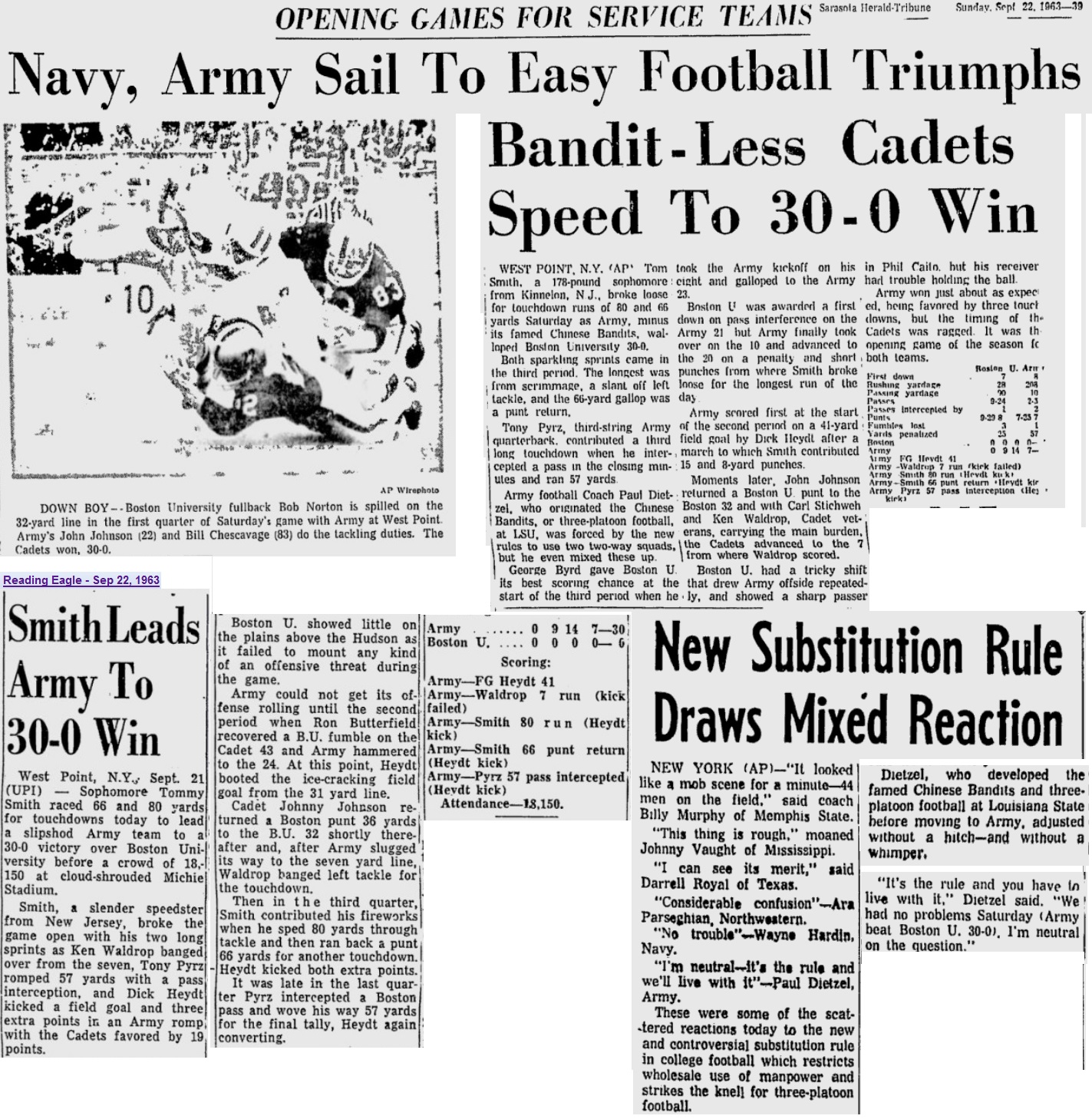
ArmyFB_1963_vsBU_various_Sep221963
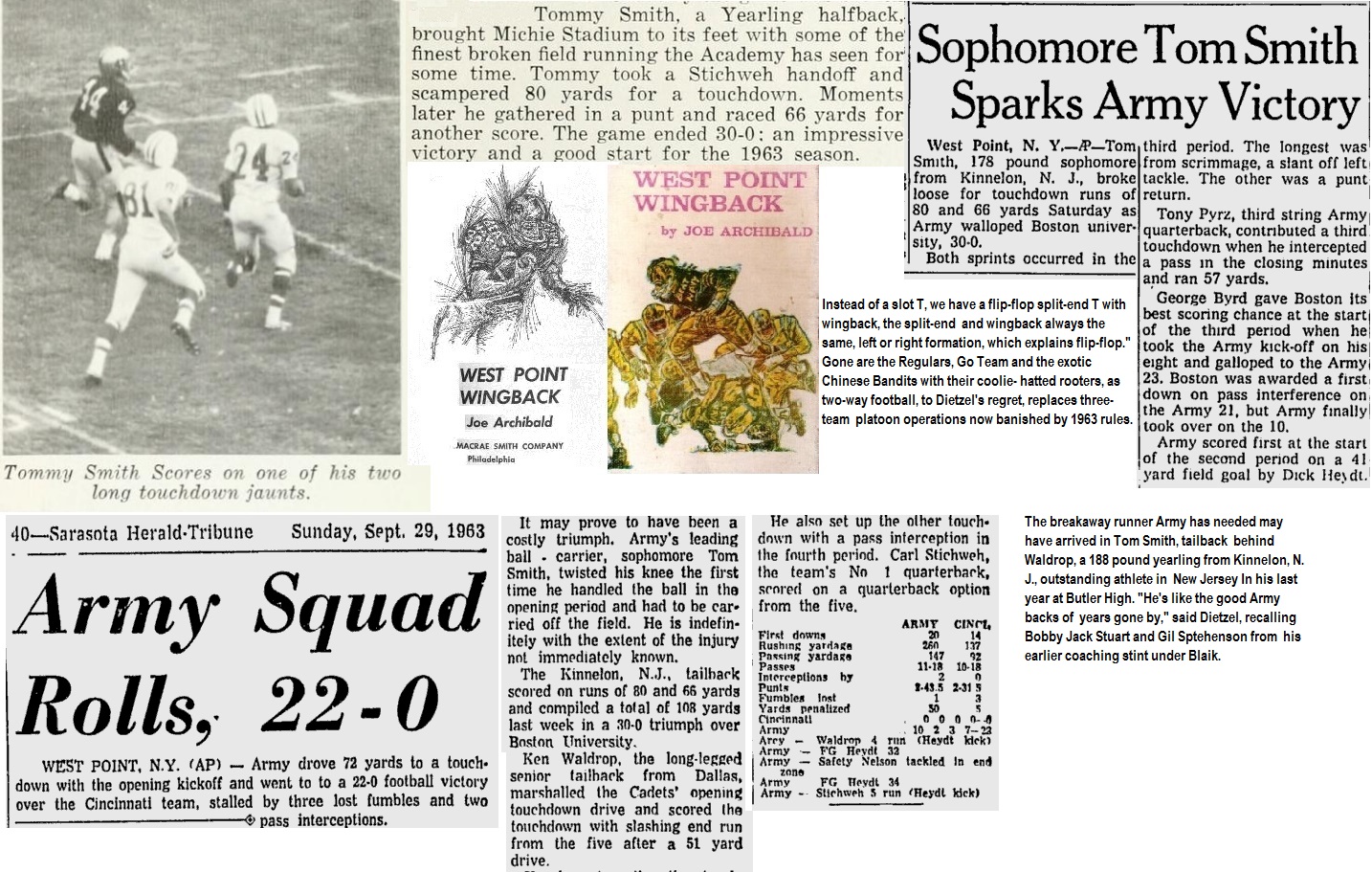
ArmyFB_1963_TommySmith_WestPointWingback_
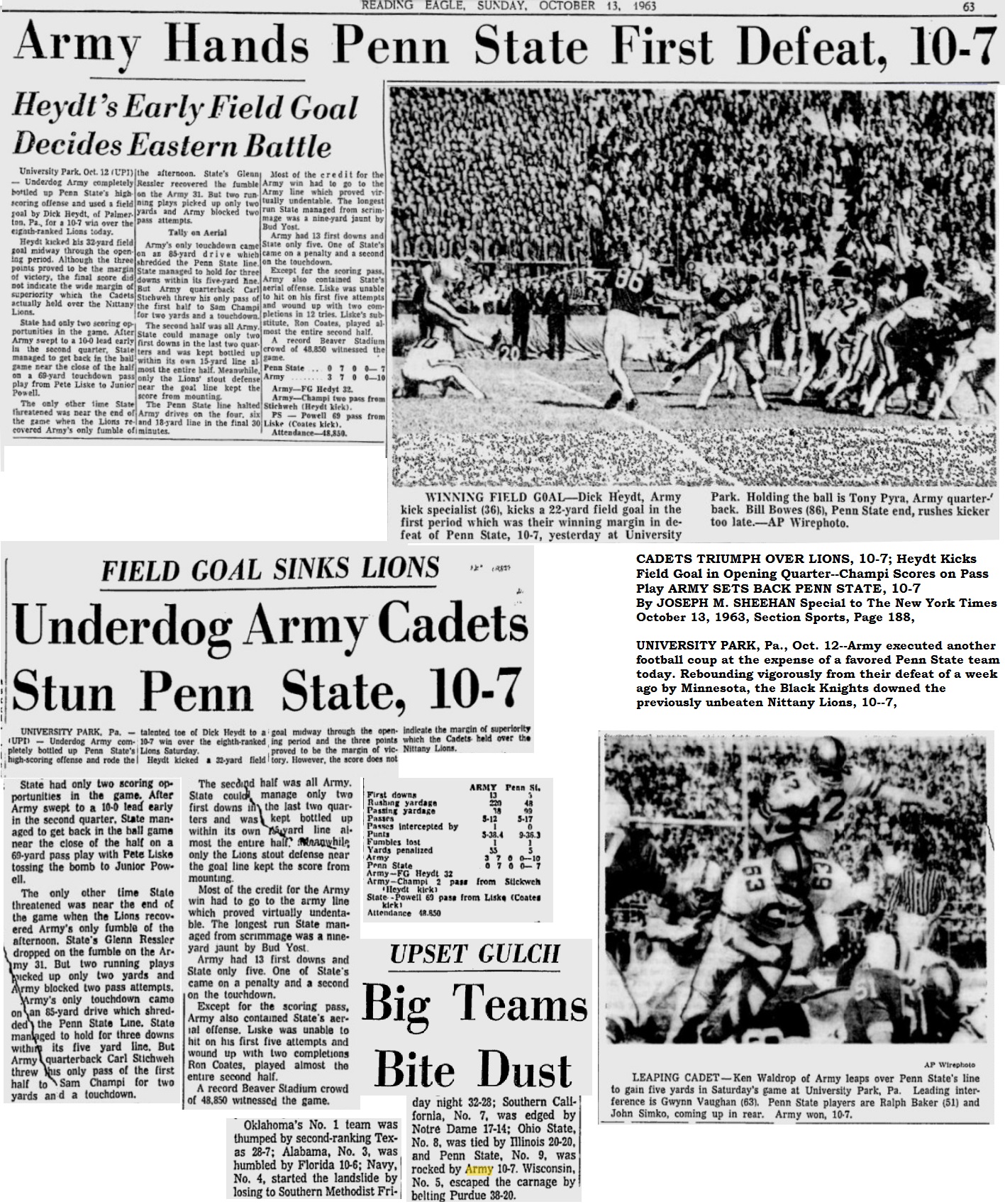
ArmyFB_1963_vsPSU_various_Oct131963
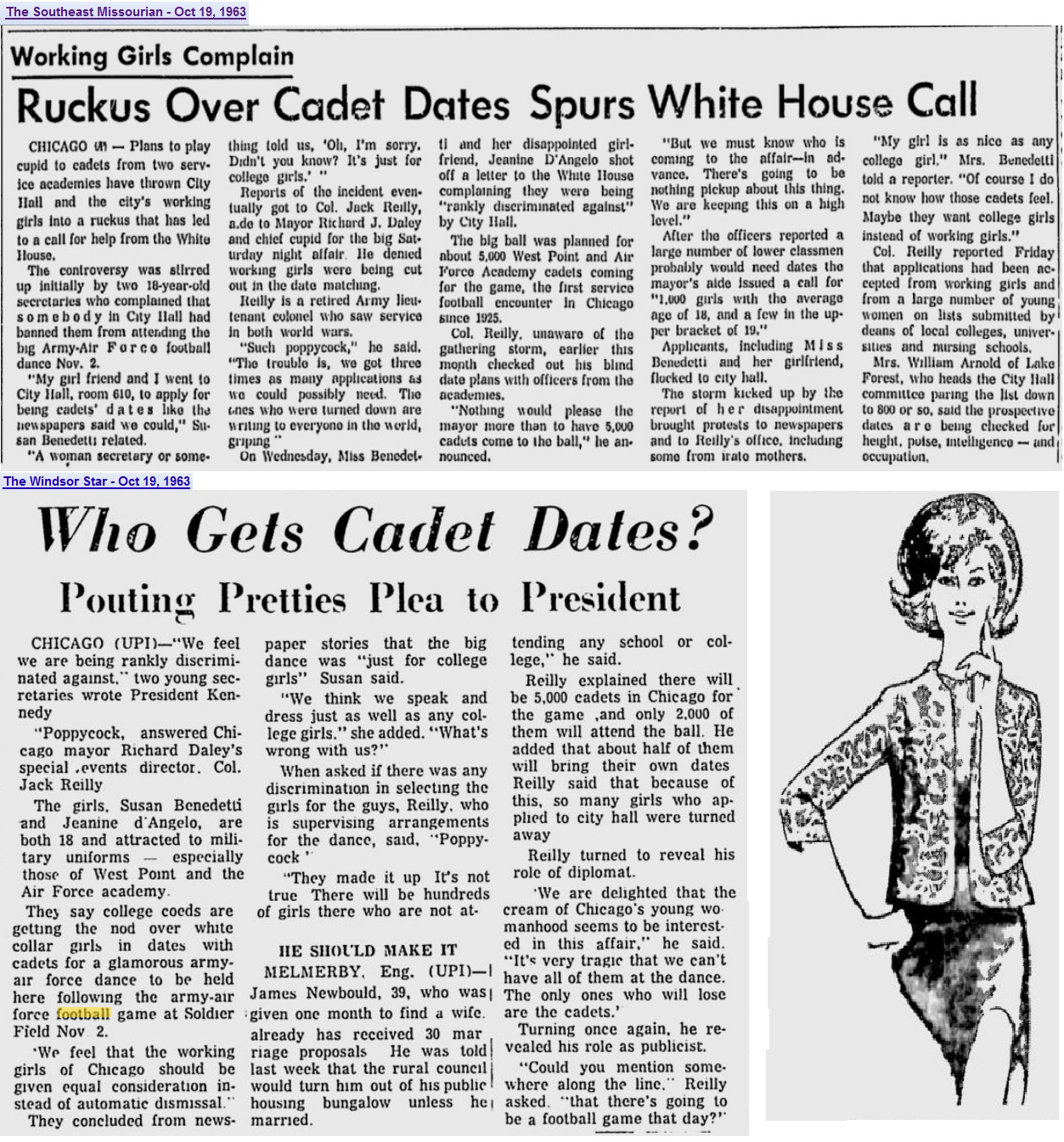
ArmyFB_1963_Ruckus_various_Oct191963

ArmyFB_1963_vsWakeForest_various_Oct201963
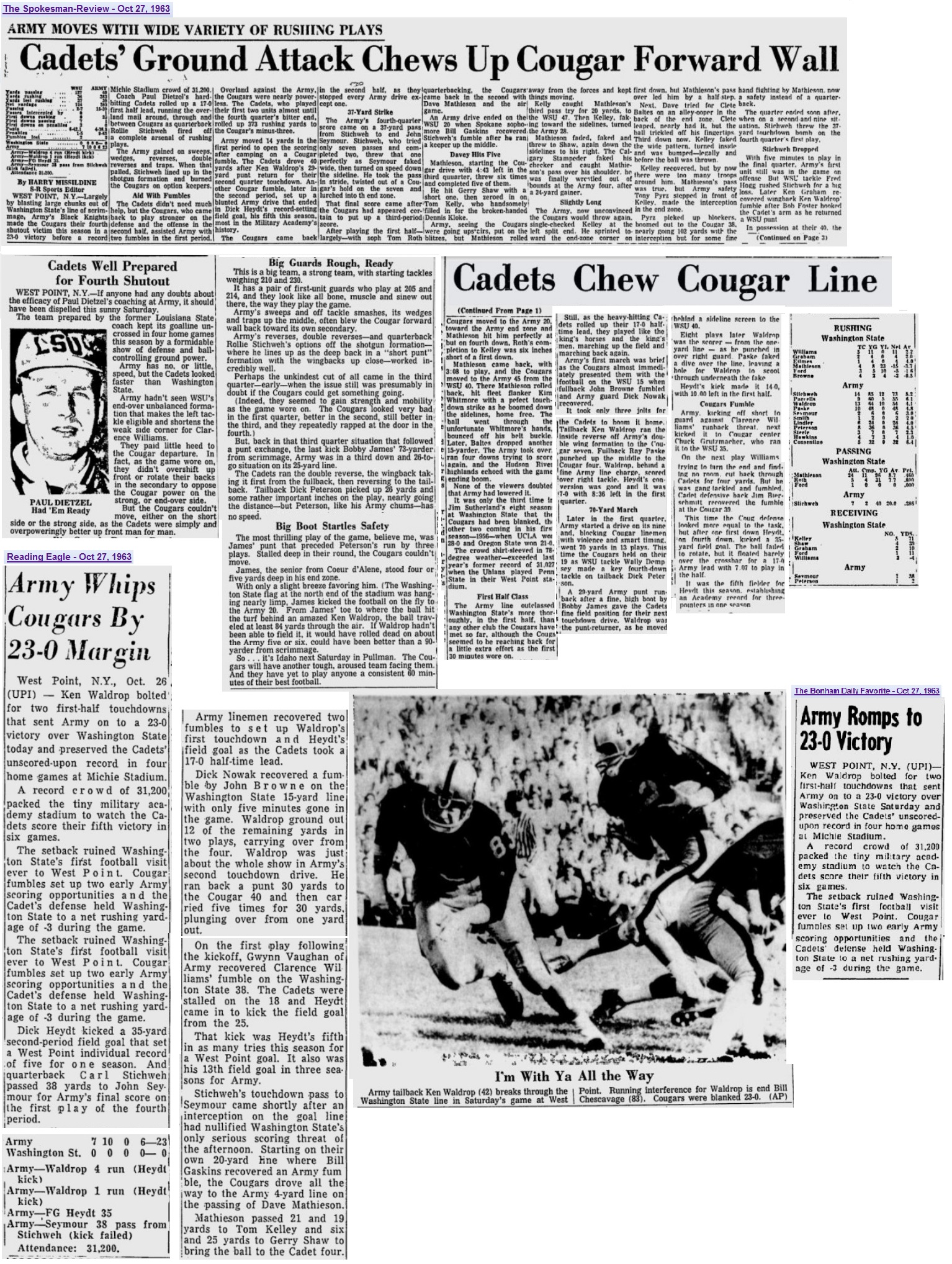
ArmyFB_1963_vsWashingtonState_various_Oct271963
-----------------------------
By Rabble
Apr 30, 2003
Tailgating - A look at Tailgating at West Point long ago.
Tailgating has always been a big part of the fun of a West Point autumn football Saturday as can be seen by this story that appeared in the New York World-Telegram and The Sun 40 years ago. Capacity back in those days at Michie was about 31,500. The new stands on the east side had been completed just the year before but the second deck on the west side was yet to be built.
Those were the days when temporary stands were erected on the playing field. Today however, this is no longer the case as the second deck at Michie more than accommodates the fans on most football Saturdays nowadays-
FOOTBALL TAILGATE SET DISCOVERS WEST POINT
By Irving T. Marsh
The New York World- Telegram And The Sun (now defunct)
October,1963
Football's tailgate set, armed with moppets of all sizes and ages as well as fancy food and martinis, has a new Saturday afternoon haven, or perhaps it should better be said that more members of the set have discovered it this year than ever before.
That haven is West Point, N. Y., on the days Army's football team plays at The Plain. For two Saturdays in a row now, picturesque Michie Stadium has been sold out to its capacity of 30,000 plus and last week's game attracted a record crowd of 31,200.
This despite the fact that the two opponents--Wake Forest and Washington State -didn't figure to provide much competition and didn't. But weather, lovely surroundings, the glamour of Army football and the new interest
of the younger young set will make 1963 the best season at the gate Army ever has enjoyed at home.
There's one more game left at Michie, with Utah two weeks hence. It's almost two-thirds sold out now. And that one shouldn't be too much of a test for the Cadets, either.
Yet the boys and girls and their offspring are descending on The Plain in ever increasing numbers.
This new found affinity of the devotees was merely an item dropped casually at the weekly Football Writers
Association Food and Gabfest yesterday at the Hotel Manhattan but it provided the stimulus for a little further investigation.
In four home games last year, Army drew 101,330 to the Point. It should go over that figure by about 25,000 this season.
Curricularly, however, the Cadets are slightly more interested in their game this week, with Air Force Academy at Chicago. The good news for that one, according to Capt. Chuck Lytle, associate plebe coach who was yesterday's emissary from the Point, was that Tommy Smith, the sophomore left halfback, will be completely ready for action against the Falcons and that can mean considerable to Army's ground attack.
Smith, from Kinnelon, N. J., has been hailed as the most exciting runner Army has had since Glenn Davis. He was tremendous in his first real effort against Cincinnati in September, but was injured in that one and didn't play until the Washington State game last weekend. He participated in one play against the Cougars and was hurt again. But not seriously. He could have returned to action but he wasn't needed. So he sat on the bench the remainder of the game to await the battle with the Air Force.
Altogether, according to Capt. Lytle, Army is in fine physical shape and only Curt Cook, sophomore quarterback who was hurt in pre-season, and Johnny Johnson, halfback are on the wounded list.
-------------------
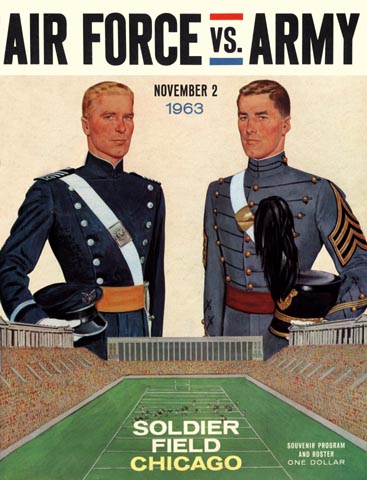

ArmyFB_1963_vsAF-Corps_ChicagoTribune_Nov31963
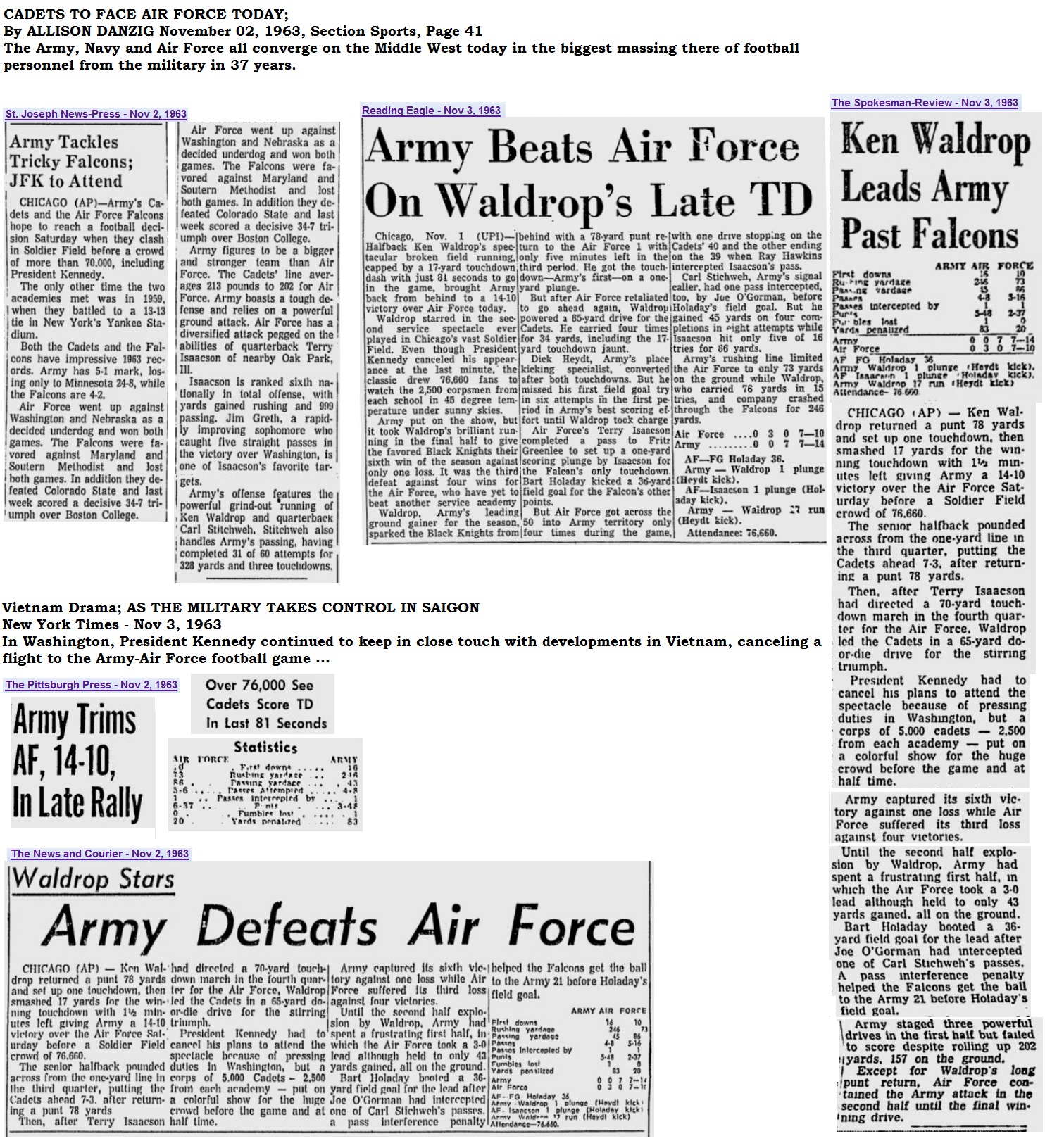
ArmyFB_1963_vsAF_various_Nov31963
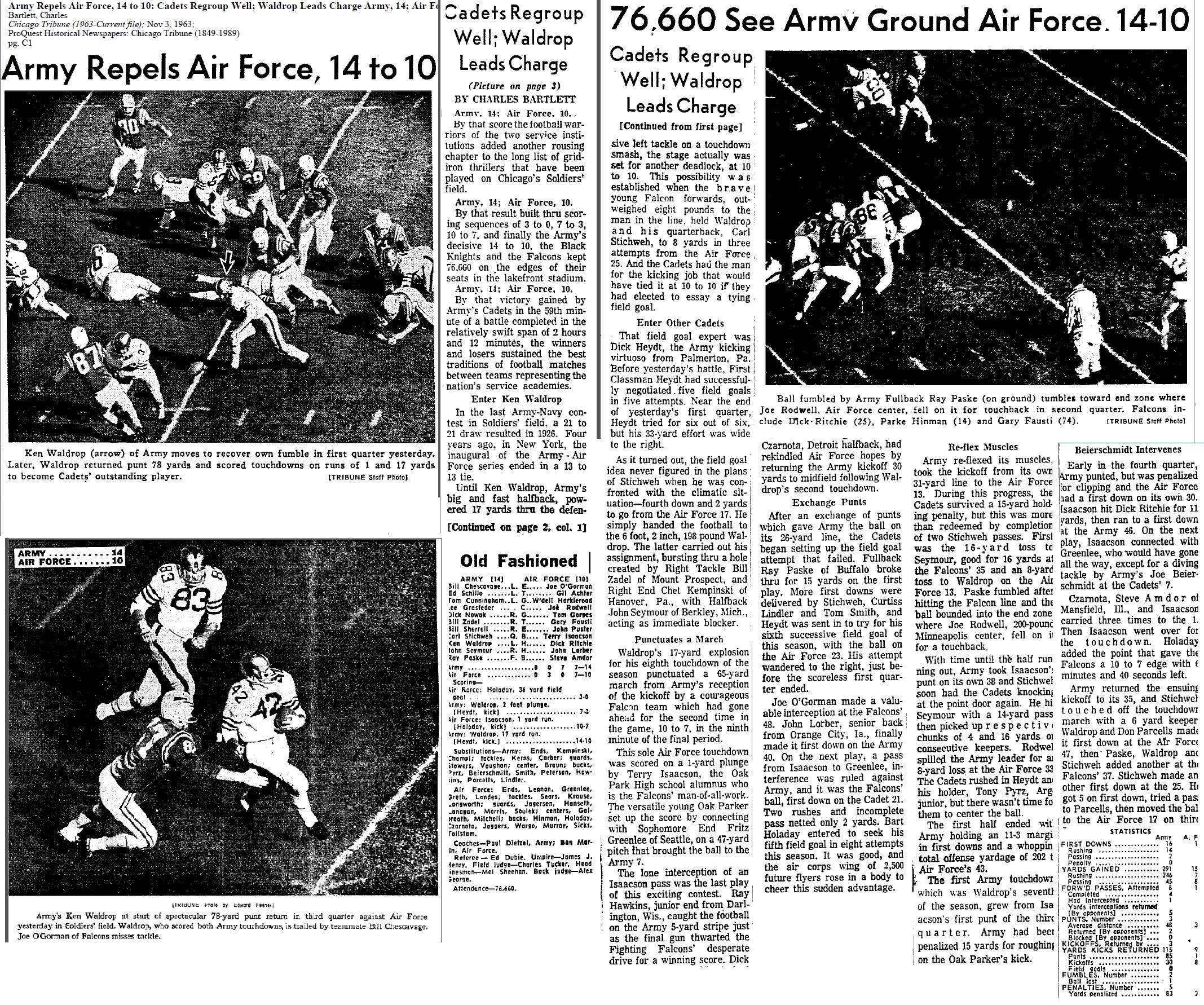
ArmyFB_1963_vsAF_ChicagoTribune_Nov31963
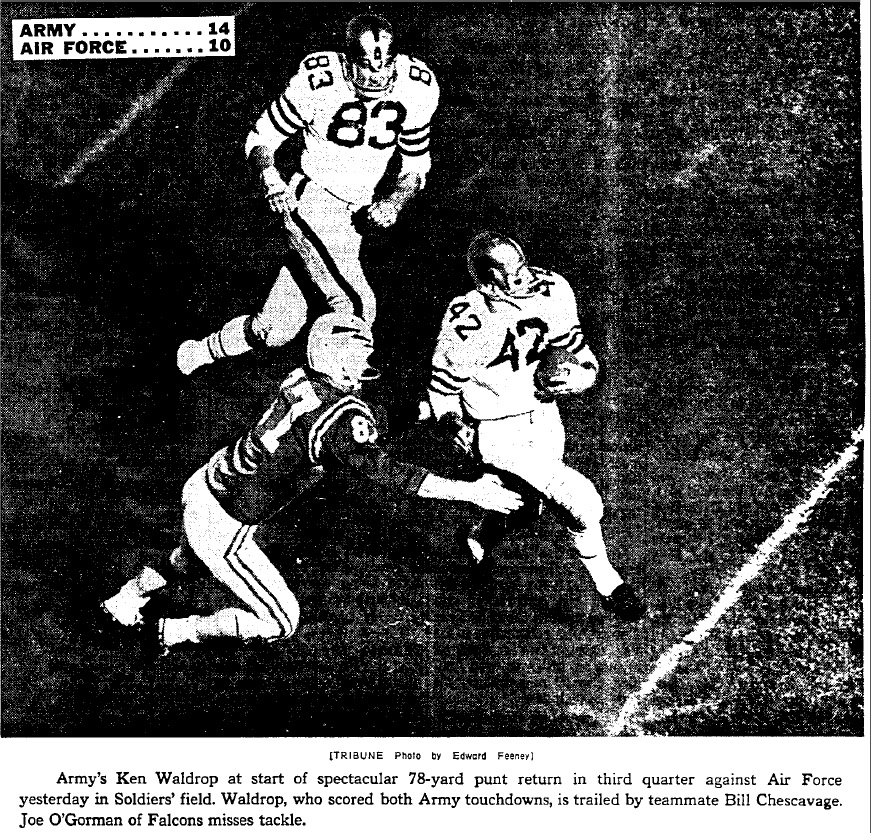
ArmyFB_1963_vsAF-Waldrop-Chescavage_ChicagoTribune_Nov31963
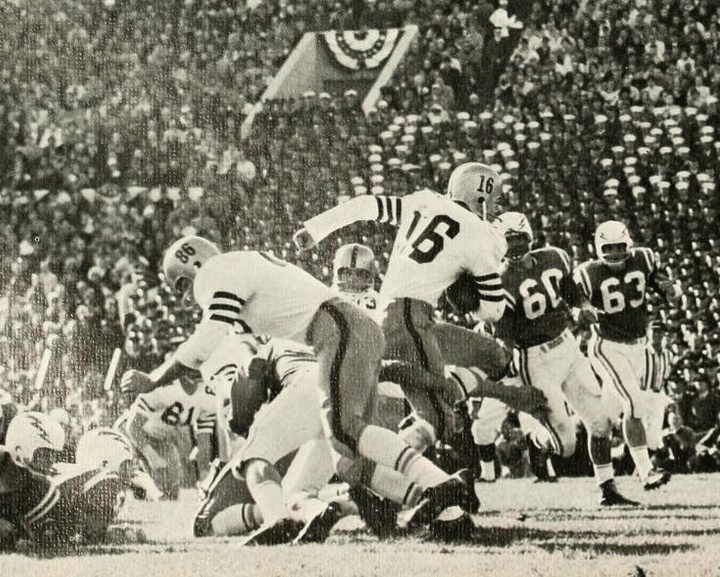
---------------
By Rabble
Apr 20, 2003
Army vs Air Force, 1963 - A look back at the 1963 Army- Air Force game.
The following is the storyline on the 1963 Army-Air Force Football game played at Soldier Field, Chicago. The entire Corps of cadets attended the contest in which Army prevailed, 14-10, winning in the last minute and a half, a close and hard-fought game between two new rivals
ARMY WINS
Army Grounds Air Force 14-10 Steve Waldrop Scores 2 TD'S
GAME AT A GLANCE
ARMY (14) AIR FORCE (10)
16 First Downs 10
246 Yard, Rushing 73
45 Yards Passing 96
5 Passes Attempted 6
4 Passes Completed 5
83 Yards Lost Penalties 20
CHICAGO, November I, 1963--- Halfback Ken Waldrop's spectacular broken-field running, capped by a 17yard
touchdown dash with just 81 seconds to play today brought Army back from behind to a 14-10 victory over Air Force.
Waldrop starred in the second service spectacle ever played in Chicago's vast Soldier Field.
Even though President Kennedy canceled his appearance at the last minute, the classic drew 76,660 fans to watch the 2,500 corpsmen from each school in 45-degree temperature under sunny skies.
Army put on the show, but it took Waldrop's brilliant running in the final half to give the favored Black Knights their sixth win-against one loss. It was the third defeat against four wins for Air Force, which has yet to beat another service academy.
HEYDT MISSES FG
Waldrop, Army's leading ground-gainer sparked the Black Knights from behind with a 78-yard punt return to the Air Force one with only five minutes left in the third period. He got the touchdown on a one-yard plunge.
After Air Force retaliated to go ahead again, Waldrop powered a 65-yard drive for the Cadets. He carried four times for 34 yards, including the 17-yard touchdown jaunt.
Dick Heydt, Amy's placekicking specialist, converted after both touchdowns. But he missed his first field-goal try in six attempts in the-first period in Army's best scoring effort until Waldrop took charge.
Air Force's Terry lsaacson completed a 47-yard pass to Fritz Greenlee to set up a one-yard scoring plunge by Isaacson for the Falcons' only touchdown. Bart Zoladay kicked a 36-yard field goal for the Falcons' other points.
AF STALLS
Air Force got across the 50 into Army territory only four times, one drive, stopping on the Cadets' 40, and the other on the 39 when Ray Hawkins intercepted Isaacson's pass.
Carl Stichweh, Army's signal-caller, had one pass intercepted, by Joe O'Gorman, before Holaday's field goal.
But he gained five yards on four completions in eight attempts while Isaacson hit only five of 16 tries for 86 yards.
Army's rushing line limited the Air Force to only 73 yards on the ground while Waldrop, who carried 76 yards in 15 tries, and his mates crashed through the Falcons for 246 yards.
Army 0 0 7 7-14
Air Force 0 3 0 7-10
SCORING-AF-FG Holaday 36. Army-Waldrop I plunge Heydt kick. AF-Isaacson I plunge Holaday kick. Army-Waldrop
17 run Heydt kick.
Attendance: 76,660.
-----------------------

Ken Waldrop
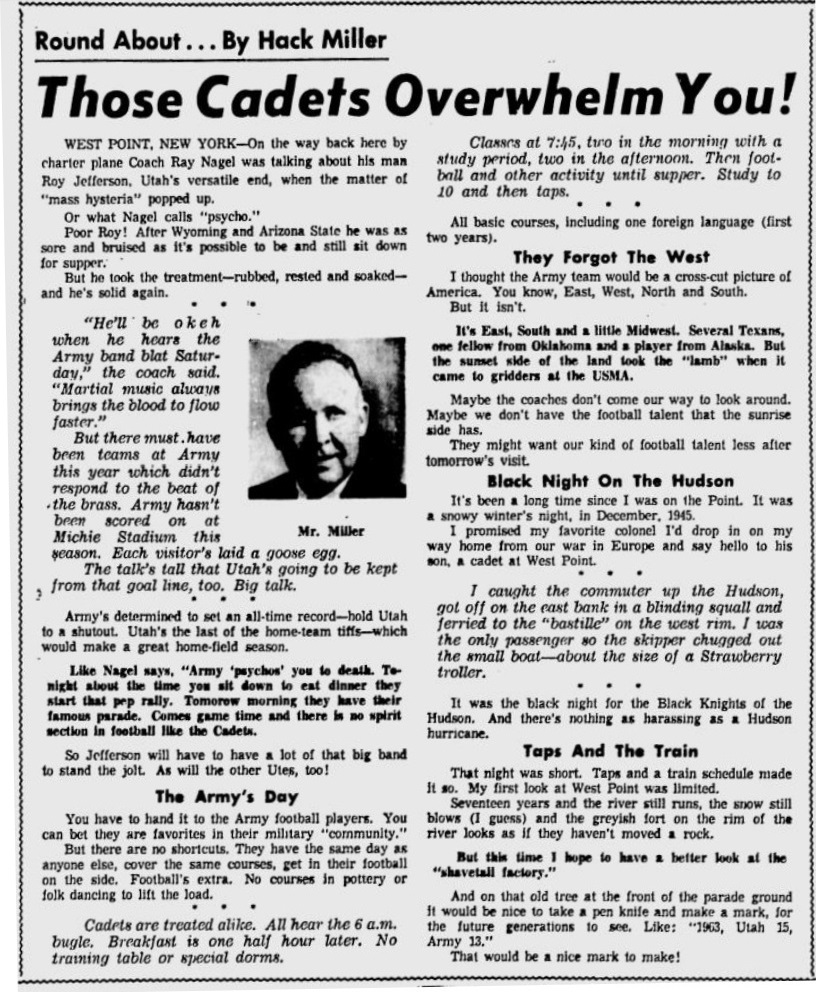
ArmyFB_1963_vsUtah_DeseretNews_Nov81963
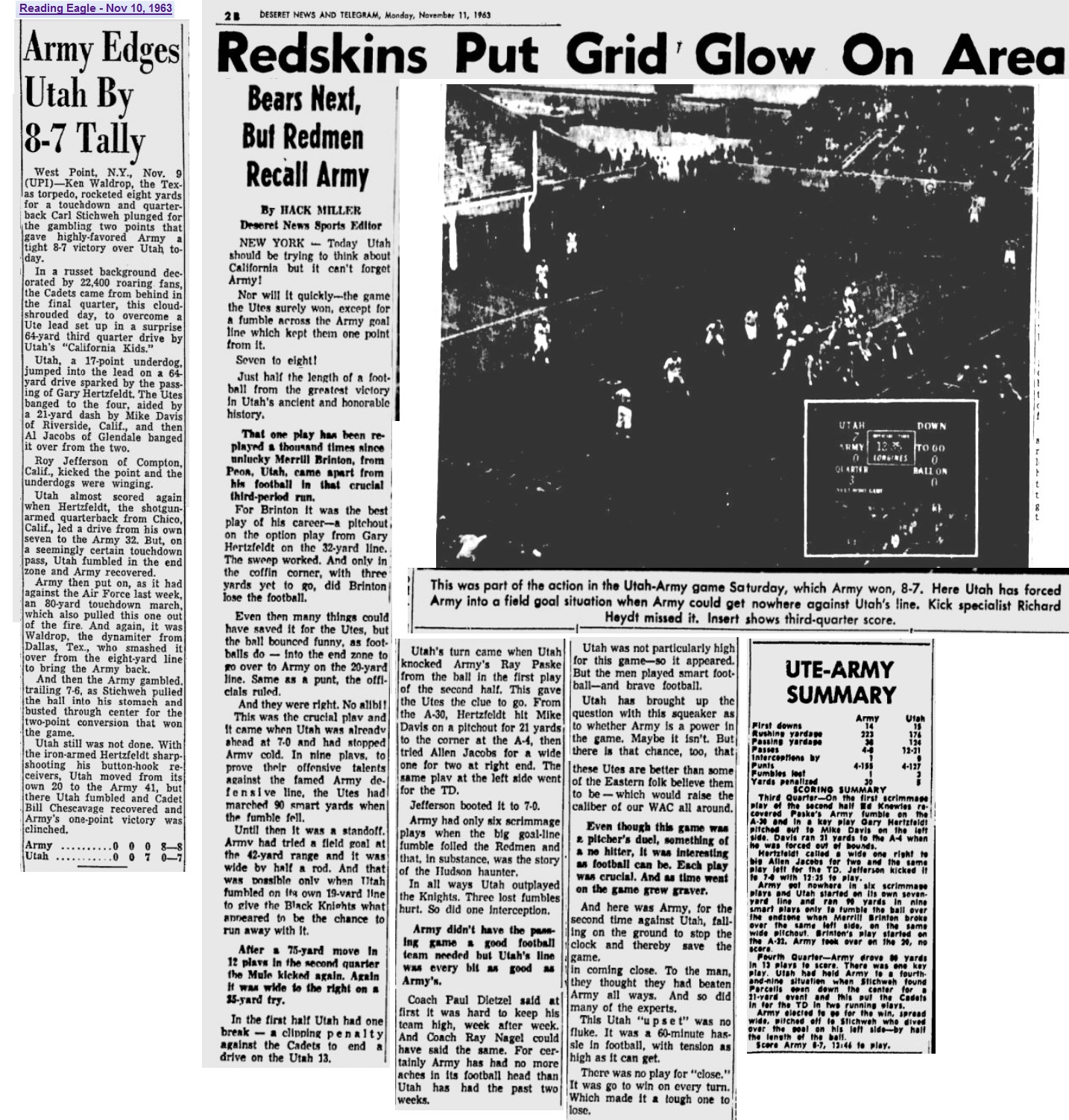
ArmyFB_1963_vsUtah_various_Nov111963
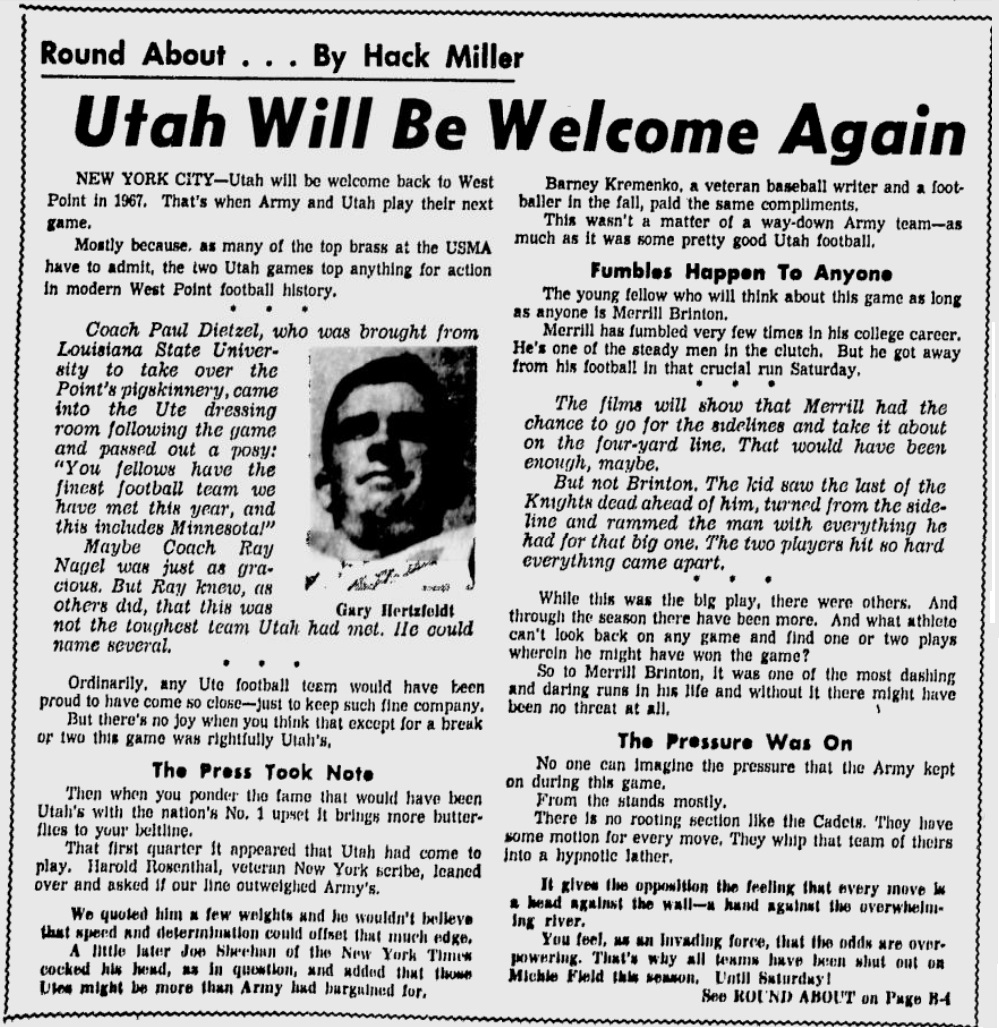
ArmyFB_1963_vsUtah_DeseretNews-p2_Nov111963
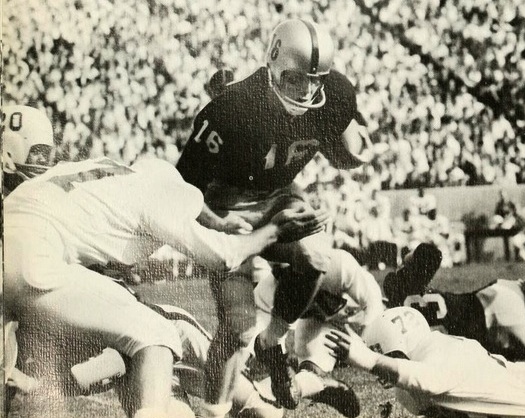
Rollie Stichweh
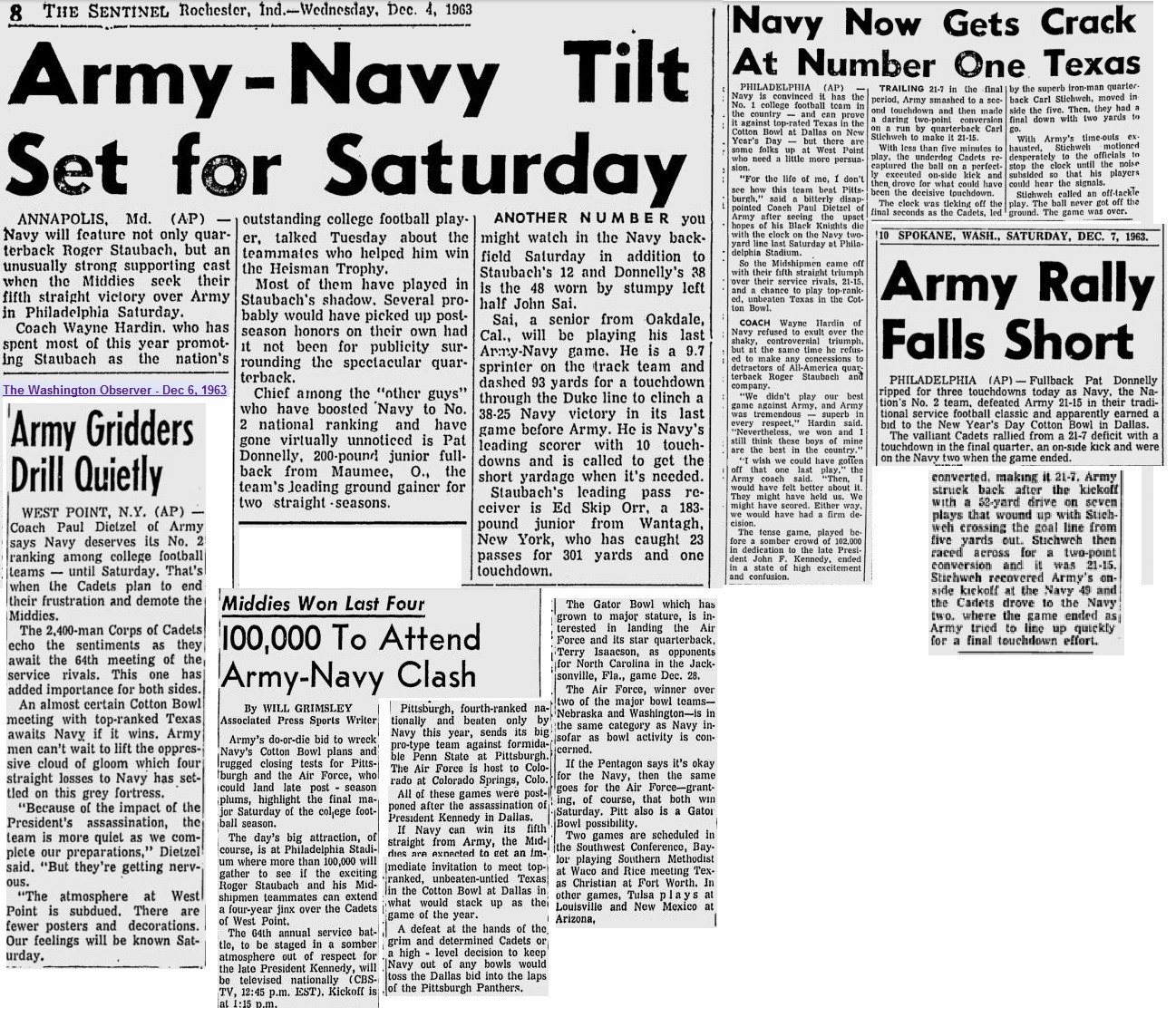
ArmyFB_1963_vsNavy_RochesterInSentinel_Dec41963-1
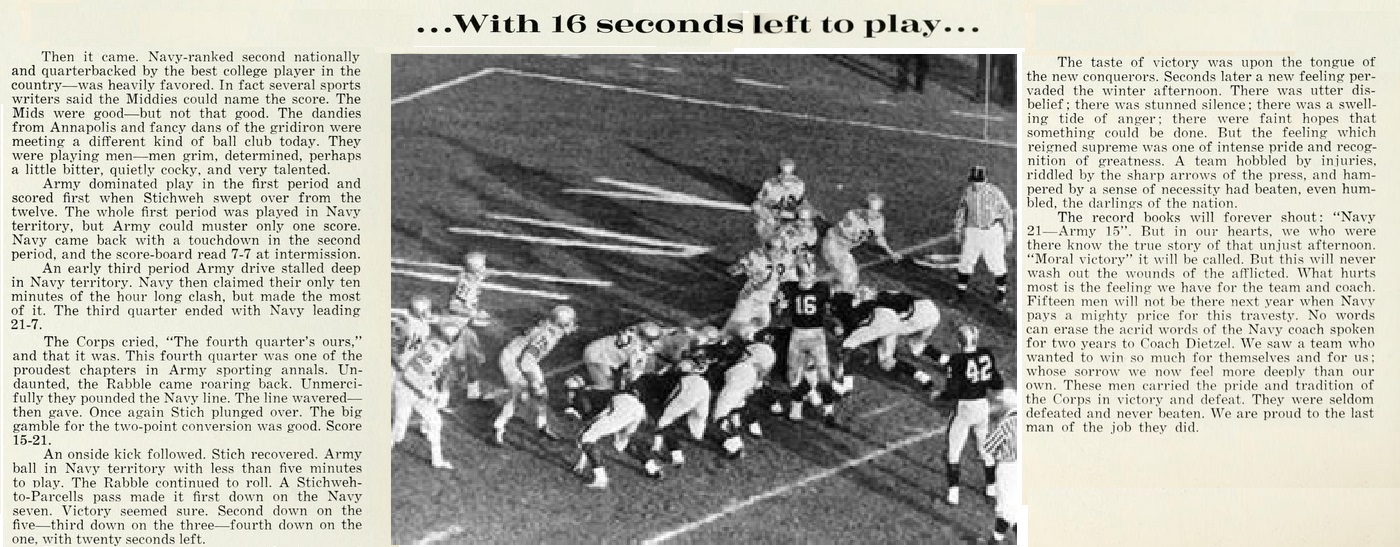
articles provided by Russ "Skip" Grimm - Class of '76
------------------
By Rabble
May 27, 2003
Army vs Navy, 1963 - A look back at the 1963 Army-Navy game.
In years gone by, there were many great Army-Navy Football Games. There were some so-so games that were interesting but largely forgettable and a few that were forgettable. One game that stands out in RABBLE's mind could be characterized in the great category. It remains one of the great ones in my opinion, a game that was nearly never played at all.
Following the assassination of President John F. Kennedy on November 22, the general consensus of opinion was that the game should be cancelled that year due to the death of the commander-in-chief just 8 days earlier. At the request of the Kennedy family, it was decided to play the game but it was rescheduled a week later than originally intended to be played.
In this trilogy of articles, one can relive the excitement and the greatness of the 1963 game as one of the truly finest in this most storied of rivalries.
--------------------------
ARMY'S BIG JOB-PLAY OWN GAME
By LEN ELLIOTT
Sports Editor
Newark Evening News (now defunct)
WEST POINT-"Don't push the panic button." That is not one of, the signs in Army football headquarters up here on the wintry Hudson. But from the way Coach Paul Dietzel talked yesterday about Navy's Roger Staubach, it is very much on his mind. You can be sure it has been impressed on the Army players, as a part of the psychological preparation for the service game in Philadelphia Saturday.
Dietzel was being pressed yesterday about Army's plans to stop the guided missile of the Severn. He would not, of course, be specific but he did say:
"You have to remember that nobody has stopped Staubach. Our Jim Valek has been scouting Navy all year and he has heard some funny conversations among scouts at their games. One scout told another that his team was going to put the heat on Staubach; that was the only way to stop him. Against that team Roger set a new Naval Academy record for offense.
The next week another scout said the first one had the wrong idea entirely. His team, he said, was not going to rush Staubach, but lie back and cover receivers. "We're going to let him pass but we don*t want him to run." Against that team Roger set another academy record for passing over 300 yards.
"The point is," Dietzel ' continued, "that you're probably not going to stop him. The important thing is that you play your game. You've got to expect him to complete some passes and make some runs. When he hits his first pass you can't push the panic button and decide your defense is hopeless."
Psychological Pressure
This could be important. Staubach has been built up to such ominous proportions-and rightly so-that he exerts at heavy psychological pressure on all opponents. When a team spends a week getting ready for him (three weeks in Army's case) and he still bombs them in the first quarter, either running or passing, it's easy to become demoralized and fall into a "what's the use" attitude.
Obviously Dietzel doesn't want any such collapse Saturday. The pressure on Army is extremely heavy, though, and so is the sense of frustration. The Cadets have lost four games in a row to Navy, two of them by big scores, and the situation is insufferable up here. No one is sure what the repercussions of another bad beating might be. It could come, too, if Army becomes demoralized Saturday.
Visible signs of determination to throw off the Navy chains are few here. The death of the President and the official 30-day period of mourning have muted the usual pre-game manifestations. Only one sign hangs from any building. It adorns the front of Grant Hall and it reads simply:
"We must. We can. We will."
On the bulletin board in the equipment room of the gym, where the boys put on their shoes before going out to practice, there are some reminders, such signs as:
"Mothball the Fleet." "Crumble Crabtown." "The Time has Come."
Most significant is a picture in the center of the board. It shows a Navy player with the number 12 on his white Jersey, running through three Army tacklers. Under it is the caption:
1 December 1962
Navy 34, Army 14
Remember Staubach!
On the physical side Dietzel says the team is in its best shape since the Air Force game Nov. 2. All the wounded who can recover have done so. This means the only boys not available are Tom Smith and Johnny Johnson, backs. It also means that Rollie Stichweh will start at quarterback, Ken Waldrop and Don Parcells at the halves and Ray Paske at fullback. If Army kicks off Saturday, Bill Chescavage will start at left end. Sam Champi of South Orange will be in if Army receives. Otherwise the first line will be what it has been practically all season-Bill Sherrell at the tight end, Ed Schillo and Bill Zadel at the tackles, Tom Cunningham and Dick Nowak at the guards and Lee Grasfeder at center.
Cook Will See Action
Curt Cook, a passing quarterback who was operated on before the season started but who was used in the last quarter of the Pitt game, is very likely to see considerable action. There are two reasons for figuring Cook will be in there: (1) he is Army's only good passer and, (2) Dietzel intimates that Stichweh will play some defense. The talented Stichweh is one of the best defensive backs Army has but he hasn't been used on defense this year because he has been running both the first and second units as quarterback.
The only time he got any rest was when the other team had the ball, at which time Jim Beierschmitt was wild-carded for him. If Cook does some quarterbacking this week, Stichweh can help the Army defense as a safety man. In the event of casualties to either, Frank Cosentino will get the call.
Despite the snow of the last few days, which has turned the rugged highlands here into a scene of dark, wintry beauty, Army has been working outdoors daily this week. The old plains field is clear, being covered at night and uncovered just before the boys come out the next afternoon.
There will be a rally tomorrow night but it won't be the lavish production of other years. The squad will leave by bus Friday morning for Philadelphia and loosen up in the stadium in the afternoon.
-----------------
FIVE FOR NAVY, 21-15
by RED SMITH
The New York Herald Tribune (now defunct)
PHILADELPHIA-- SILENT In the sunshine, 100,000 citizens stood with heads bared as 100 cadets from West Point and 100 midshipmen of Annapolis drew up In 18 alternate ranks at the north end of the green-dyed field. In flawless alignment, the ranks moved to midfield, halting there to face a color guard from the other end zone.
Cadet Rithard A. Chilcoat, first captain of the corps, made the simple announcement: The cadets and midshipmen dedicated this game to the memory of our late commander-in-chief, John Fitzgerald Kennedy.
First captain of the midshipmen, Walter W,. Kesler asked for a minute of silence.
The West Point band played the National Anthem. From that moment on, nothing seemed less important than football, yet seldom in the 73 years since cadets and midshipmen first butted skulls in fun has an Army-Navy game furnished more captivating entertainment than this 64th Installment of the series.
Seldom has there been a keener match than this rouser between the heavy favorites from Annapolis and the victims of four consecutive conquests by the sea arm.
The way Army fought for this one, only the clock could have stopped the rabble's rush, and only the clock did, 21-15.
Maybe it was the calculated insult embroidered on every fetching Navy playsuit which brought out them beast in Army. In recent years the midshipmen have turned this meeting into a fancy dress ball, decking themselves out in uniforms of unaccustomed splendor just for the Army game.
This time they turned up all regal shimmering gold from helmets to the cunning half-socks above their two-toned booties. Across the withers of each gob read the words, "Drive for Five," an exhortation in Navyese, a galling reminder to the Cadets that they had lost four in a row.
Whether Army took this as a goad or whether the team was operating under forced draft even before the kickoff, the delegates from up the Hudson simply smashed Navy flat the first time Army had the ball, going 65 yards on a pounding running game for the opening touchdown.
Navy had held the ball for only three plays, and was in the bucket, 7 - 0.
Not many teams contain the wonderful Staubach for 24 minutes and nobody does it for 60. In the 10th minute of the second period he steered Navy to the 2-yard line and sent the 200-pound fullback, Pat Donnelly, in from there for the tying touchdown.
Then In the third quarter with Staubach passing and Donnelly running, Navy went 90 yards to take the lead, and in the fourth two 15-yard penalties for roughing helped Annapolis pad the margin to 21-7.
Before Navy's third touchdown, Army had been stopped on fourth down with inches to go for a first on the Navy 7. After the touchdown the Cadets went 52 yards and weren't stopped until Carl Stichweh, the quarterback, got his cleats in the end zone turf. Stichweh ran for a two- point conversion, too, so now Navy's lead was a mere 6 points at 21-15.
Army did the obvious thing and did it perfectly -a carefully aimed 11-yard kickoff which Stichweh captured for West Point, to begin a drive to the threshold of victory as the ball game ticked away.
1963 New York Herald Tribune Inc.
----------------------------
Dietzel's New Bandit-Stichweh
ROLLIE THE ROBBER BARON ALMOST HEISTED VICTORY
By SANDY GRADY
CLEVER DEVIL, that Paul Dietzel. They outlawed his Chinese Bandits, so the Army inventor hauled a new gadget to Philadelphia Stadium-a lone German bandit named Carl Roland Stichweh, who almost pulled the boldest daylight heist since the Brinks job.
When this shimmering, blue-eyed day began, there was only one quarterback in the Army-Navy game-Roger Staubach, who had gotten hotter notices in the sporting print than Khrushchev draws in Pravda. By dusk, there were certainly two quarterbacks on the scene. Stichweh vs. Staubach had given this cold, concrete barnyard its closest, toe-to-toe war since Marciano vs. Walcott.
Rollie the Robber Baron almost swiped everything but Navy's mustard-yellow britches- indeed, he came within one play of stealing the Middies' 21-15 victory. Army may forever remember the 1963 game as Dietzel's Unfinshed Symphony, the clock catching the Cadets two yards from a walloping upset, but the controversy should not obscure Herr Stichweh's heroics.
"Stichweh was the best quarterback on the field," said, Dietzel of his pale, wheat-haired Teutonic marvel. Well, what about it, Wayne Hardin? "Stichweh didn't surprise me," said Hardin. "He's a helluva football player. A lot of guts."
Herr Rollie Lives Up to Name
IN GERMAN, Stichweh translates as "sharp, pain" and Herr Rollie certainly gave one to Navy right in the neck. If statistics mean anything in such a fluid, see-saw afternoon, Stichweh measured against Staubach like this: He was a better runner (10 yards to 55 yards), but not so sharp a passer (three for 25 yards). It is as impossible as comparing sirloin steak with pie a la mode.
"We're different types," Stichweh said,"his cheeks coloring when questioned about Staubach. "Staubach is very capable. I'd better leave it at that."
Staubach had a victor's warmth toward the vanquished: "Rollie's great. He's just a terrific runner." It was a year ago that Stichweh busted the No. 1 rule of every buck private: "Never volunteer." On the bus leaving Philadelphia Stadium, Rollie leaned over to Dietzel and said, "Sir, I know we're losing all three of the quarterbacks and I'd like to give it a try." A defensive back, Rollie had been a fair passer at Mineola High, L. I., but he was the swiftest bloke on Dietzel's squad as Navy discovered repeatedly on Stichweh's rollouts.
Grabbing the spotlight away from Staubach, of course, is tougher than stealing a scene from Jackie Gleason. Stichweh did it the hard way - "he played 55 minutes, going both ways," reminded, Dietzel. There were raw, red welts on Rollie's back as testimony to the ordeal.
"I'm just sorry we couldn't win it for the 14 seniors on this club," said Stichweh, draping his sinewy, 6-4 frame in Army gray, "I guess I'll never forget the end of this one. I was yelling to the guys, calling Waldrop to run a power sweep off tackle, but they couldn't hear me for the crowd noise. Then the referee picked up the ball and handed it to Navy's (Tom) Lynch and I knew the game was over."
Damp-eyed Cadets filed by Stichweh's locker, all of them shaking his hand with a variation on the same comment: "Rollie, you were the greatest on the field." Maybe the only trophy they could take away, though, was Hardin's gracious admission: "It was unfortunate for Army, because one more play would probably have taken them in for the victory."
Even for Army-Navy, the head- banging was usually fierce. "I've never played against a team that hit that hard,' said Staubach. "Whew, they were racking us up. We couldn't play our real game because they were knocking us over our feet." And as Roger noted, two defensive plays were pivotal moments Army stopped Navy early on its goal, and Navy later bashing in Army four-and-one on the eight- "I called a bad play," Dietzel moaned.
Stichweh and Dietzel came with one thought: ram the ball down Navy's throat on the first drive, control the ball, never let up the pressure. It was a simple as repeatedly conking a guy on the temple with a ballpeen hammer- Stichweh would roll right or left, and then Waldrop would burst to the right on a weakside reverse. With those two plays, Army jammed 65 yards to score and kept Navy in 60 minutes of trouble.
Cadets Wouldn't Give Up
If Staubach was less impressive than usual, Hardin knew why. "We didn't have the ball enough," said Hardin. And Staubach said to his dad, eyebrows raised in disbelief, "Why, I didn't get my hands on the ball but one time in the last quarter, those guys wouldn't give it up.'
A tough ground-slogger named Pat Donnelly, who scored three times, probably saved Navy's hide. "He's the next All American at Annapolis," crowed Rick Forzano, the guy who recruited Staubach.
Indeed, Navy didn't lead until Donnelly thrashed into the end zone with 37 minutes of action gone. Then they moved ahead, 21-7. Bang, Army fought back to make it 21-15 - "A magnificent effort," said Dietzel -but incredibly Army could not go 49 yards in six minutes to win it. You would think they were freezing the ball.
"Gee, we went 80 yards against Air Force in less time than that," mourned Stichweh. "I couldn't believe we wouldn't make it. No, I didn't want to pass out-of-bounds and stop the clock because we needed the downs. The time outs were gone. At the end I sort of hugged Skip Orr of Navy -he and I were high school friends -and he said, 'Sorry Rollie.'"
So Hardin's "drive for five" policy paid off, and you couldn't blame Dietzel for one chagrined needle.
"How did Navy ever beat Pitt?" be wondered out loud. The question for scholars now, though, is: Can Navy beat Texas? "We're going to put it to them, said Staubach of the Cotton Bowl opponent. "They can't hit any rougher than Army did. Nobody can." Maybe it will be Dietzel's time to drum up the slogans now: "Off the Floor in '64" maybe. Or "Nix on Six.' Or "Gun for One."
Pleasantly for the 102,000 buffs, both Stichweh and Staubach will be on the stage again. With these guys around, you pay $8.50 to see a million-bucks worth of quarterbacking.
1963 Philadelphia Bulletin
-----------------------
Jun 10, 2003
America's Game - Jack Clary, long-time New York Telegram columnist, wrote quite a bit
Jack Clary, long-time New York Telegram columnist, wrote quite a bit of print about the great football rivalry that is Army-Navy over his career. The following is one of the many he wrote about the history of the game and what it has meant to the collegiate football world. It appeared in the New York Telegram the week before the 1964 renewal of that great series--
AMERICA'S GAME - ARMY vs. NAVY
The Nation's Football Rivalry
By JACK CLARY
The New York World-Telegram and The Sun (now defunct)
On a cold, clear early December afternoon in 1899, a workman climbed to the top of Franklin Field's wooden stands in Philadelphia and hurled a huge batch of tickets to passersby walking below. He yelled to them to pick them up and come in and see Army and Navy play football.
Two years later, 25,000 persons jammed into the same wooden stands. Most were there by receipt of a printed invitation but many paid scalpers from $25 to $50 per invitation to watch the Army-Navy game.
Times have not changed much in the ensuing 63 years. Tickets for the Army-Navy game are just as hard to get as ever, even this year when both teams have a losing record. But never is the apparent tide of battle to be gauged by a team's season record.
History has proven a stern teacher.
In the series' second game, Navy had a 6-0 record and Army, in its first full intercollegiate season, was 4-1. Yet the Cadets lacked the experience of the Naval Cadets who had won 24-0 the previous year. Final 1891 score at Annapolis: Army 32,Navy 16.
In the most recent game, Navy, ranked second nationally and with its finest team in history, was a 13-point favorite to beat the Cadets last year in Philadelphia. After 59 minutes and 58 seconds, Army finally succumbed to a roaring cauldron of noise from 102.000 persons, a cruel clock and a tough Navy defense to lose 21-15 in what many consider the most exciting finish in the series' 64-game history.
Exciting? Absolutely. But this is the heart of the Army-Navy history- -thrills, color, pageantry, military precision and an indominatable desire to do the impossible.
The 1948 Navy team had not won a game when it faced unbeaten, untied Army. But a pair of old hands who had almost beaten the great Doc Blanchard and Glenn Davis juggernaut of 1946-also to be stopped by a clock brought the Middies a 21-21 tie.
Seven years later, an All-American named Don Holleder entered Municipal Stadium as a beleagured, badgered and much- criticized quarterback. He threw only two passes that day missing both-but brought the Cadets an astounding 14-6 victory over a once-beaten Navy team that had won in the Sugar Bowl the previous New Year's Day.
Upsets, surprises are as commonplace in the series as astounding individual enterprise. Take the field goal kickers. In Navy's 1910-11-12 victories, Jack Dalton and Babe Brown scored all the Middies points on field goals. Clyde King did the same thing, 6-0, in 1919. Slade Cutter booted what many feel is the most famous field goal in the series' history for a 3-0 Navy victory in 1934, its first since 1921. Ed Garbisch did an about-face for Army with his four goals in 1921 and a 12-0 victory in Baltimore.
The all-time football performers from each school took particular delight in each renewal, starting with Red Emerich who scored a series' record 20 points In the 1890 opener, to Roger Staubach and his unbelievable passing and running heroics the past two years.
Army's Lou Merillat paced two victories in 1913 and 1914 and Elmer Q. Oliphant scored Army's points a 14-0 victory the following year and nine of 15 in a 1916 victory. During the Roaring Twenties, Army rode to victory behind Light Horse Harry Wilson and Chris Cagle in 1927 after Wilson had he1ped the Cadets to a 1925 victory. Both combined to ho1d Navy's national champions to a 21-21 tie in Soldiers Field in 1926.
Blanchard, Davis, Arnold Tucker & led the Black Knights from a five-game losing streak in the series from 1943-46 after Middie stars such as Ben Martin, now Air Force Academy coach, Hal Hamberg and Bill Busick, present Navy athletic director, had led the Middies resurgence.
Since the erd of World War II, the game has stayed in Philadelphia where Bob Zastrow led Navy's amazing 14-2 upset in 1950; where Red Blaik brought his team from the shadow an alleged cribbing scandal; in 1951 to a 20-7 victory in 1953; where the 1954 Team Named Desire put Navy in the Sugar Bowl; where Pete Dawkins and the Lonesome End Bill Carpenter got Army's last win in 1958; and where Joe Bellino and Staubach have ruled since.
------------------------
|
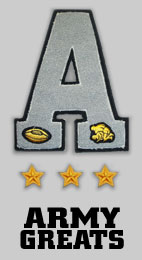
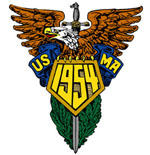
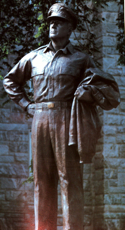 General MacArthur stated it would take
General MacArthur stated it would take 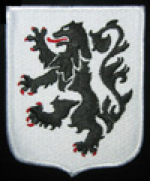 28th Infantry Regiment
28th Infantry Regiment 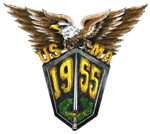
 They played perhaps Army's Greatest Game.
They played perhaps Army's Greatest Game.
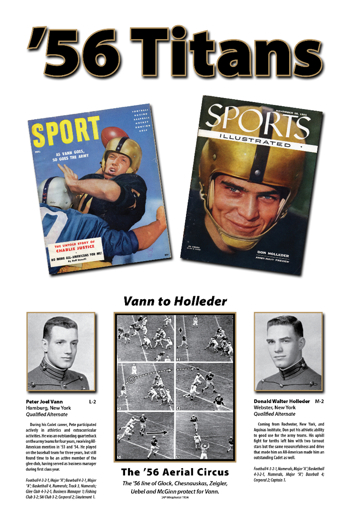
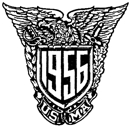
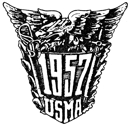
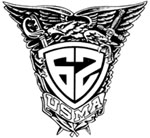
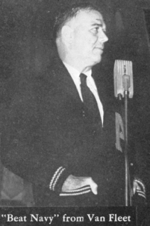

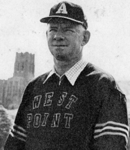
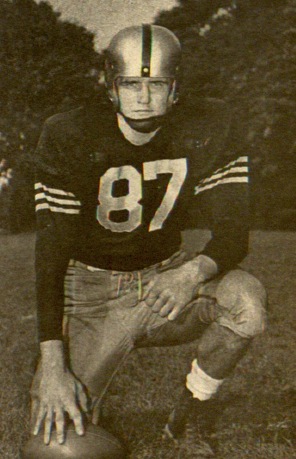

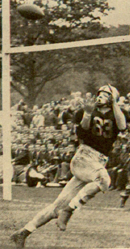
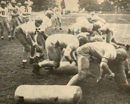
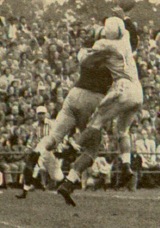
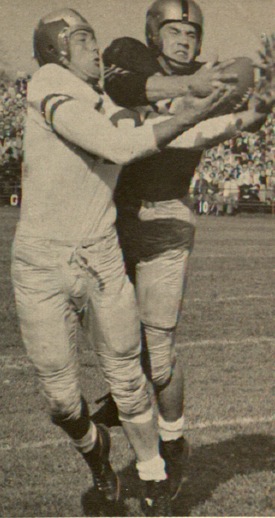
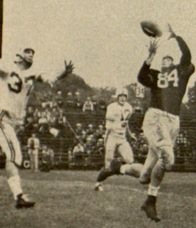
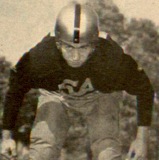
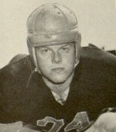
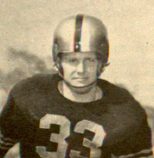
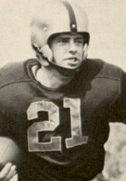
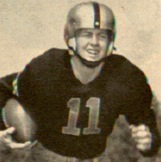
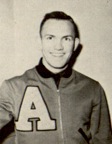
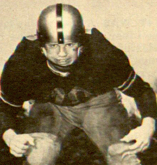
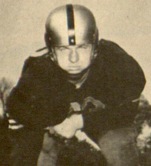
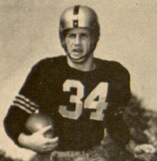
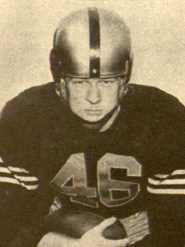
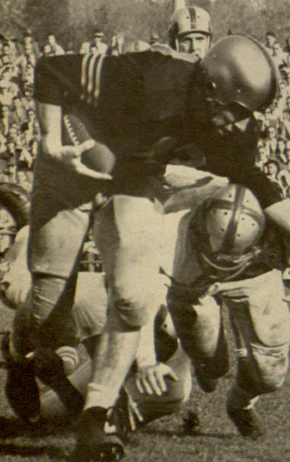
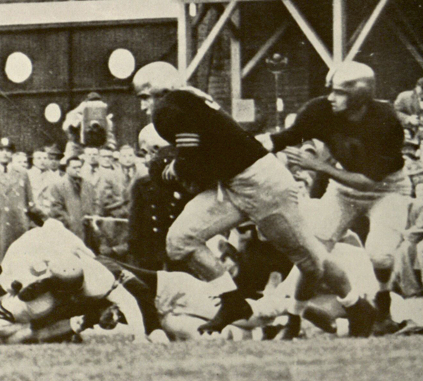
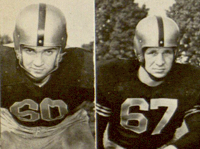
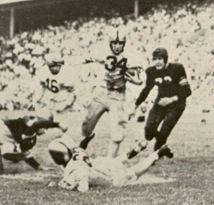
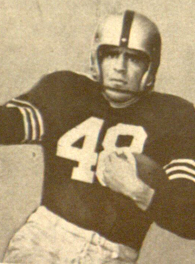
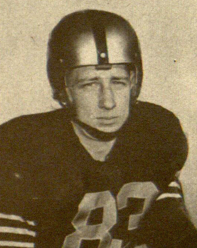

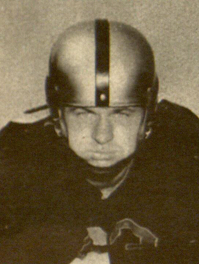
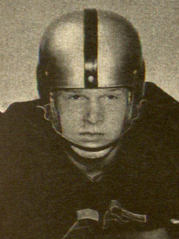
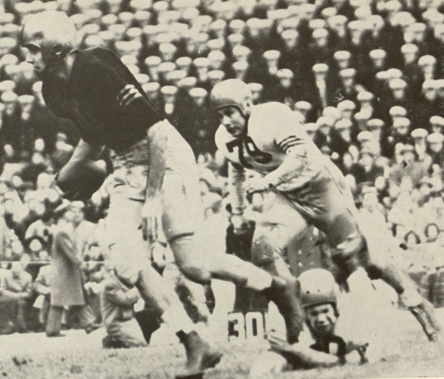
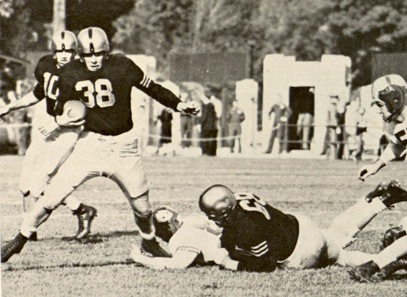
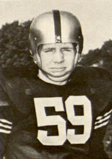
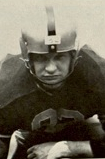
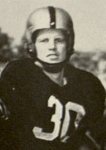
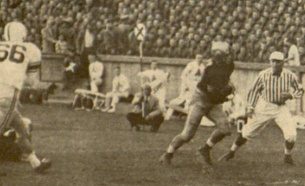
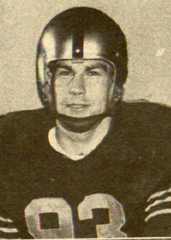
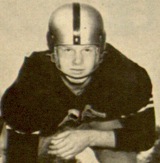


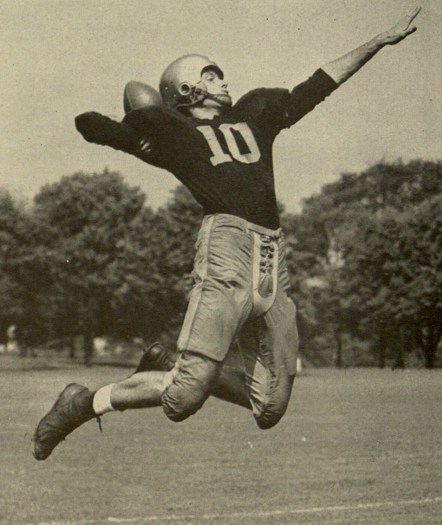
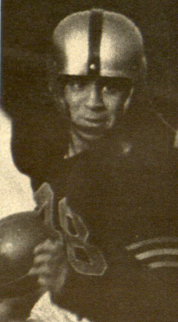
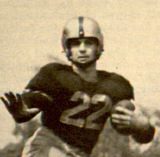
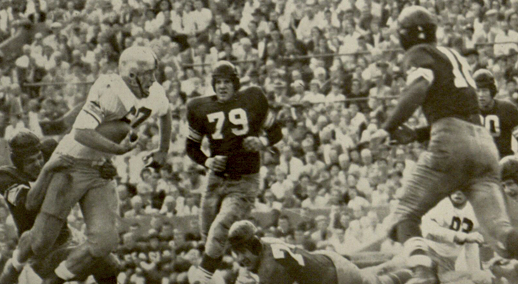

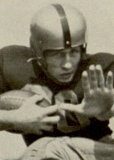
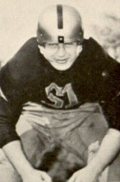
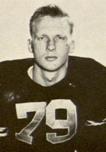
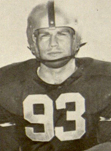
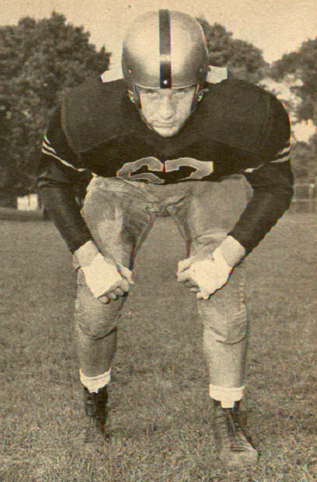
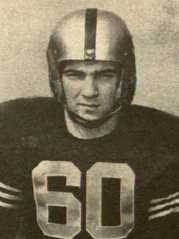
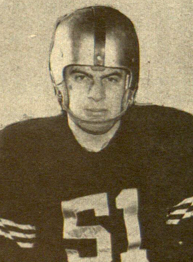
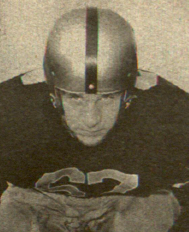


 General MacArthur stated it would take
General MacArthur stated it would take 



 They played perhaps Army's Greatest Game.
They played perhaps Army's Greatest Game.




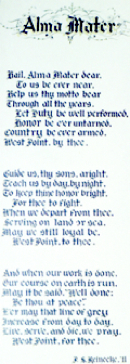
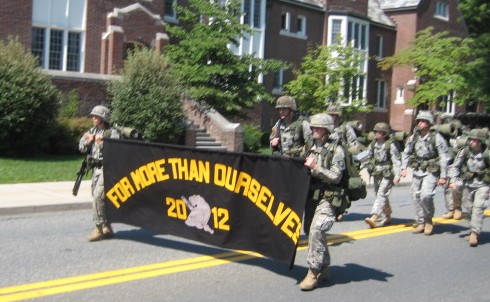
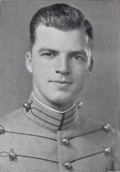


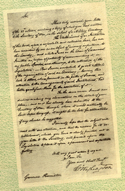
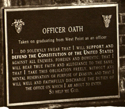


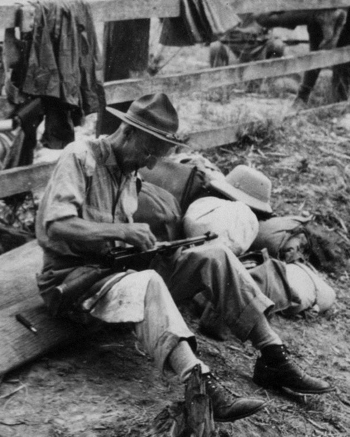
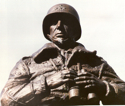
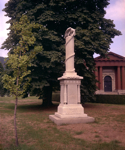
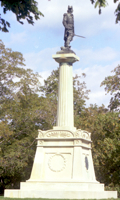
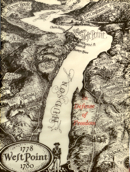
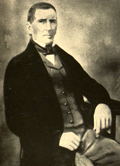

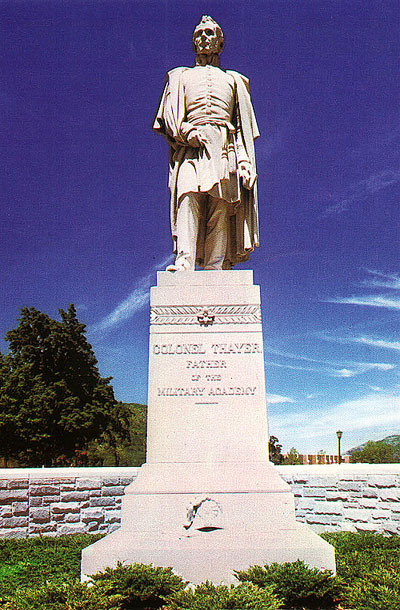
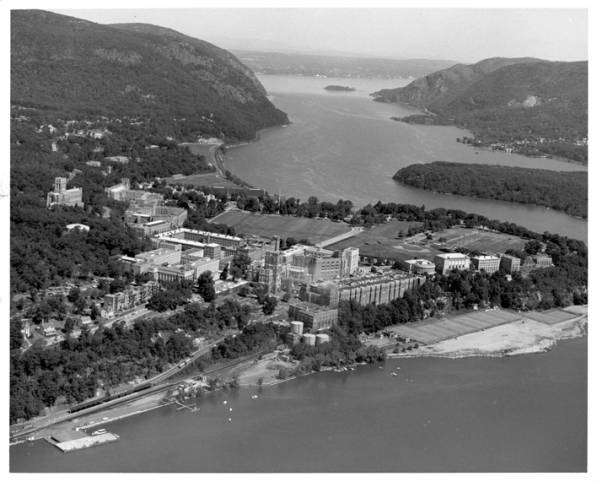

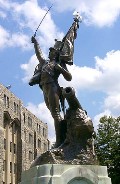




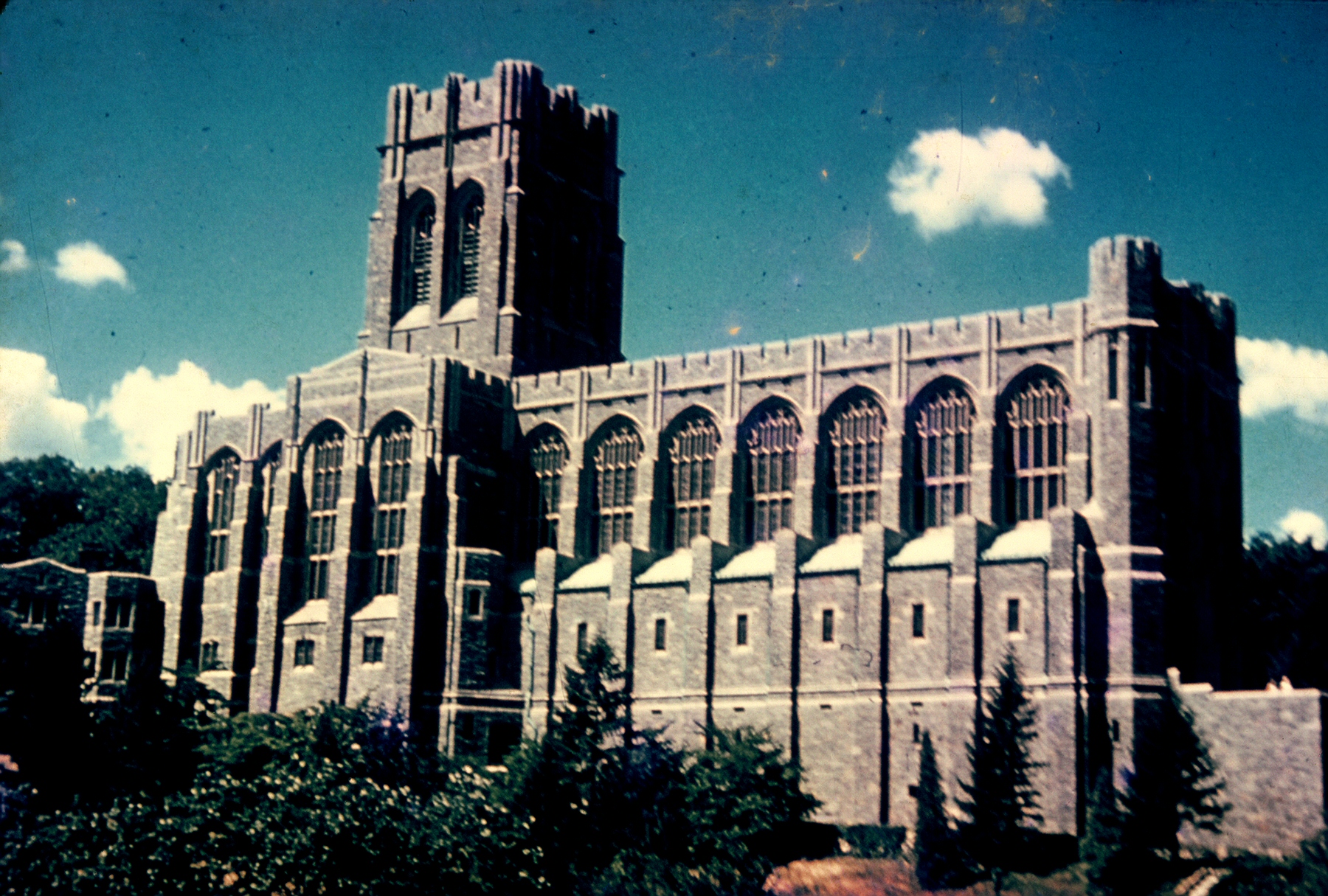






 Cadet Barracks
Cadet Barracks



